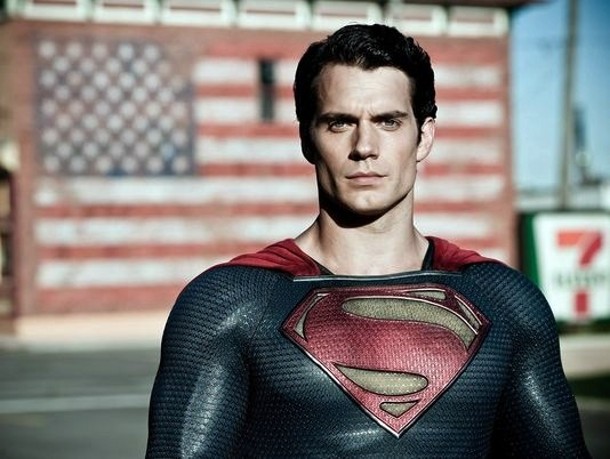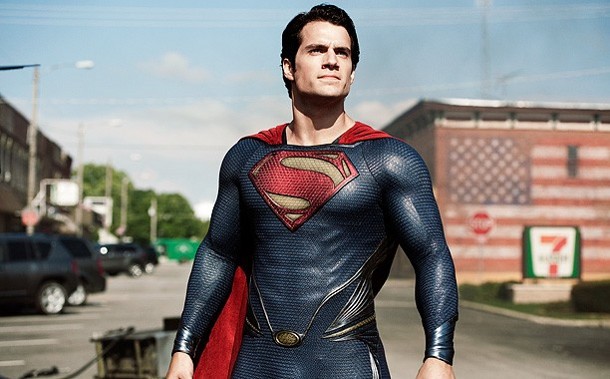EXCLUSIVE: Producer Charles Roven Talks Man Of Steel
Grounding Superman, casting Henry Cavill and escaping the shadow of 1978...
As this summer's crucial Superman reboot approaches, producer Charles Roven takes flight with SFX...

You were a producer on the Christopher Nolan Batman movies. What perspective on superheroes did that trilogy give you?
That’s an interesting question. The character of Kal-El is very different from Bruce Wayne, because Kal-El is not from Earth, he’s an alien and he’s got extraordinary superhuman abilities because of that. Bruce is human, he’s extraordinarily human, and he’s taken his abilities to an unbelievable place for a human. Notwithstanding that - and maybe in some ways because of that, together with his past - he’s got issues and complications that we can get caught up in, that we find interesting. He’s not just a character where we know exactly what he’s going to do at all times. What we try to do is to make these characters understandable, relatable, to find the shared things that they have with us that we can not only relate to but get emotionally involved in.
Superman and Batman are both pulp characters but Batman comes from that pulp detective tradition and Superman is very much from the pulp sci-fi tradition. Was it quite a challenge to ground a character as fantastical as Superman?
That was the biggest part of our goal. And it informed everything that we did, starting from the script to the way that we cast it to the way Zack shot the film in terms of the cinematic style that he used, the action, everything. Even though you’re taking something that is science fiction and fantastical you’re executing it in a way that grounds it. We did our job. As Zack is fond of saying, even though it’s about a superhero, it’s still in many ways the most realistic film that he’s ever done.
Do you think Superman’s brand of blue-eyed decency is a hard sell in the 21 st Century?
Exactly. So you have to have a character that doesn’t look at the world as black and white. You have to have a character that is questioning things, that has emotional conflicts and issues. We’ve tried to bring that to the table.
Weekly digests, tales from the communities you love, and more
He was the first of the superheroes but we now have a movie marketplace that’s absolutely crammed with superhero characters. How do you keep him credible and special in that kind of arena?
Hopefully by doing the things that I’ve just laid out, by really making him completely relatable and making sure that the film delivers on all the areas that we’re expecting – we expect spectacle, we expect fun, we expect excitement, we expect great action, but also bringing to the table things that are maybe going to surprise us. The depth of the characterisations, the execution of the actors in their characters and the emotional resonance to us of what these characters are going through.
We had some brief discussion about it, certainly, but ultimately everybody realised that the symbol, the glyph, that S, even if it’s slightly modified, is so universally recognised. I think it’s in the top five of universal symbols that are recognised by the population of the world. So we felt confident that as long as that was there – not to mention that when you look at the character and he’s actually wearing a particular suit with a cape – that the audience would know what the movie was. We approached the making of Man Of Steel as though there had never been a movie made about this character before, and by giving it a new title we hoped that furthered that impression.
The 1978 Richard Donner movie casts such a long shadow. Is your way of escaping that shadow to pretend that movie never happened?
All of us who worked on the film are big fans of that movie, but we wanted to make a different film. We wanted to make a movie about a a different interpretation of that character, and so we needed to make sure that we divorced ourselves from that movie not because we didn’t honour it and respect it but because we wanted to make a different film. One of the things that Bryan Singer did when he made Superman Returns was he created an homage to that movie, and I think that in some ways that didn’t work in the way that he imagined it.
So was that almost like a test case for you where you looked at Superman Returns and said “This is the path that we shouldn’t go down”?
It wasn’t even as complicated as that. David Goyer and Chris [Nolan] were working on breaking the story for The Dark Knight Rises and while they were talking about that David was talking about something that was percolating in his head, and that was this idea of how to reimagine Superman. They started talking about that at the same time and ultimately broke that story as well. And so that story was always the basis of what this movie is. Once we had that story that was so different, and we had a character who was so different from any Superman character that had come before, we just wanted to follow that track.
Choosing a director is obviously as crucial as casting your star, so what sold you on Zack’s vision for Superman?
When Zack read the Goyer script he had his interpretation of how he wanted to take that blueprint and realise it into a film, both from his notes on the screenplay to his visual execution – and it was thrilling, and everybody bought into that vision and wanted to make sure that we could help him realise it.
And did it help that Zack had form with comic book adaptations after Watchmen and 300 ?
Definitely. It was a definite draw that he understood some of the issues with a quote superhero unquote film. Again, it’s interesting because Watchmen had characters in it that were just humans but had extraordinary abilities, but it also had characters that had turned into superheroes. And that was an interesting added value, if you will, that he brought to the party. And of course he brought his unique ability to execute this film in his amazing signature style – and yet he was going to do something very different, that he had never done before. He executed on that too.
This is slightly more of a realist take for Zack, isn’t it?
Correct. As he said, this is the most realistic film, even though it’s about a superhero, that he’s ever shot. His whole style, everything that we did, was designed to bring that to the fore.

Can you talk about the casting process? Obviously there must have been a very vigorous selection procedure to get your Superman…
We took time and care to really make sure that we looked completely for the right actor to play Clark/Kal-El. But from early on the casting directors talked to us about Henry. Some of us knew Henry from The Tudors . I was fortunate to be able to look at some Immortals footage as a result of my relationship with Relativity. Henry actually tested for an earlier version of Superman that ultimately didn’t get made – it was the script that was written by JJ Abrams and he was one of the finalists. Now obviously he was much younger and they were playing that Superman younger, but now he had become a more mature guy. Our Superman, once we come to present day, is a more mature adult. So he was always in the running. He gave a spectacular reading. He was really the only individual that we tested. We used the suit from the archives that Chris Reeve used in Superman , because we didn’t have anything to put him in when we tested him. We couldn’t just make a suit for that one test. And so when he came out of the trailer it was impressive. And he hadn’t done any of the bodywork that he ended up doing once he’d got the role. He really turned his body into one where you go “Wow, that guy really is Superman!” But when he came out of the trailer and he was wearing that suit he was impressive. He definitely walked the walk. The character of Clark goes through an emotional journey throughout the film and as I said earlier the character’s not black and white, he’s got questions and he’s searching. And so Henry needed to bring that to the table as well and not just be the chiselled guy. And he was able to do that, in a really great way.
Everyone’s talking about the Marvel/DC rivalry in terms of building cinema universes. Do you see Man Of Steel as the first building block of a DC universe? And where can we go beyond this film?
Well, I think you can go anywhere beyond this film that the mind can take you, and certainly we’ve been reading online all of the various possibilities being laid out there by both fan sites and fans. Our goal has been to focus on Man Of Steel and to get it out there for old fans and new fans, and we think it’s a film that the whole family can go and enjoy. But we really want to focus on making this the best movie it can be, and then who knows what can happen.
But I imagine you are having discussions about that…
Oh, I’m not doing anything but focusing on this movie. [laughs]
Nick Setchfield
Man Of Steel is released June 14 by Warner Bros

Nick Setchfield is the Editor-at-Large for SFX Magazine, writing features, reviews, interviews, and more for the monthly issues. However, he is also a freelance journalist and author with Titan Books. His original novels are called The War in the Dark, and The Spider Dance. He's also written a book on James Bond called Mission Statements.


